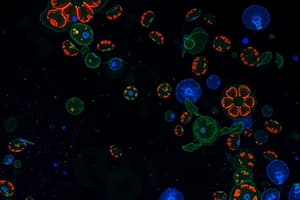Podcast
Questions and Answers
What information does a complete blood count (CBC) provide about a person's blood?
What information does a complete blood count (CBC) provide about a person's blood?
The CBC provides information about the counts of white blood cells, red blood cells and platelets, the concentration of hemoglobin, and the hematocrit.
What do the red blood cell indices indicate?
What do the red blood cell indices indicate?
The red blood cell indices indicate the average size and hemoglobin content of red blood cells.
What is included in a white blood cell differential?
What is included in a white blood cell differential?
A white blood cell differential counts the different types of white blood cells.
How can a complete blood count (CBC) be used in medical assessment?
How can a complete blood count (CBC) be used in medical assessment?
How are the results of a complete blood count (CBC) interpreted?
How are the results of a complete blood count (CBC) interpreted?
What is flow cytometry used to detect and measure?
What is flow cytometry used to detect and measure?
How are cells or particles prepared for analysis in flow cytometry?
How are cells or particles prepared for analysis in flow cytometry?
What is the role of fluorescent markers in flow cytometry?
What is the role of fluorescent markers in flow cytometry?
What are some common uses of flow cytometry?
What are some common uses of flow cytometry?
What is the approximate number of cells that can be quickly examined in flow cytometry?
What is the approximate number of cells that can be quickly examined in flow cytometry?
Flashcards
Complete Blood Count (CBC)
Complete Blood Count (CBC)
A blood test that measures various components, including red blood cell count, white blood cell count, and platelet count.
Red Blood Cell Indices
Red Blood Cell Indices
A type of blood test that measures the size and hemoglobin content of red blood cells.
White Blood Cell Differential
White Blood Cell Differential
A component of a CBC that identifies the different types of white blood cells, including neutrophils, lymphocytes, monocytes, eosinophils, and basophils.
Flow Cytometry
Flow Cytometry
Signup and view all the flashcards
Fluorescent Markers
Fluorescent Markers
Signup and view all the flashcards
Preparing Cells for Analysis in Flow Cytometry
Preparing Cells for Analysis in Flow Cytometry
Signup and view all the flashcards
Anemia
Anemia
Signup and view all the flashcards
Reference Range
Reference Range
Signup and view all the flashcards
Common Uses of Flow Cytometry
Common Uses of Flow Cytometry
Signup and view all the flashcards
Cell Analysis Capacity of Flow Cytometry
Cell Analysis Capacity of Flow Cytometry
Signup and view all the flashcards
Study Notes
Complete Blood Count (CBC)
- A complete blood count (CBC) provides information about a person's blood, including the number of different blood cells, their size and shape, and other characteristics.
- It measures various components, such as hemoglobin, hematocrit, red blood cell count, white blood cell count, and platelet count.
Red Blood Cell Indices
- Red blood cell indices indicate the size and hemoglobin content of red blood cells, which can help diagnose anemia, a condition characterized by a lack of red blood cells or hemoglobin.
- The indices include mean corpuscular volume (MCV), mean corpuscular hemoglobin (MCH), and mean corpuscular hemoglobin concentration (MCHC).
White Blood Cell Differential
- A white blood cell differential is a component of a CBC that identifies the different types of white blood cells, including neutrophils, lymphocytes, monocytes, eosinophils, and basophils.
- This information helps diagnose infections, allergies, and inflammatory diseases.
Medical Assessment
- A CBC is a useful diagnostic tool in medical assessment, helping healthcare professionals diagnose and monitor various blood disorders, such as anemia, infection, and blood cancer.
- It can also aid in monitoring the effectiveness of treatment and detecting potential complications.
Interpreting CBC Results
- CBC results are interpreted by comparing them to a reference range, which is a set of values that are considered normal for a particular population.
- Abnormal results can indicate a range of conditions, including anemia, infection, inflammation, and blood cancer.
Flow Cytometry
- Flow cytometry is a laboratory technique used to detect and measure the characteristics of cells or particles, such as size, shape, and surface proteins.
- It is commonly used to diagnose and monitor blood cancers, such as leukemia and lymphoma.
Preparing Cells for Analysis
- Cells or particles are prepared for analysis in flow cytometry by suspending them in a fluid and passing them through a specialized instrument.
- The instrument uses a laser to detect and measure the characteristics of the cells or particles.
Fluorescent Markers
- Fluorescent markers are used in flow cytometry to label specific cells or proteins, allowing them to be detected and measured.
- These markers emit a fluorescent signal when excited by a laser, which is then detected by the instrument.
Common Uses of Flow Cytometry
- Flow cytometry is commonly used in cancer diagnosis and monitoring, as well as in immunology and infectious disease research.
- It is also used to evaluate the effectiveness of stem cell transplantation and to detect minimal residual disease.
Cell Analysis Capacity
- Flow cytometry can quickly examine an approximate number of 10,000 to 30,000 cells per second.
Studying That Suits You
Use AI to generate personalized quizzes and flashcards to suit your learning preferences.



